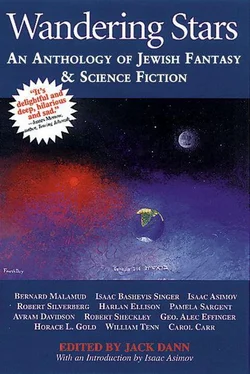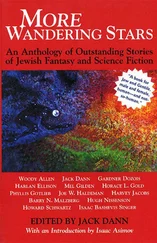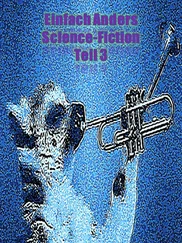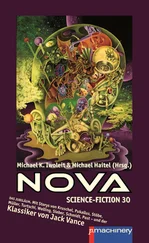At last, finally, after all the traditional Jewish preliminaries, they got down to the real problems of the opening session: the accreditation of delegates. And there, in no time at all, they got stuck. They got stuck and all mixed up, like bits of lox in a lox omelette.
The Bulbas. The three from my bathroom, the three from Max Guttenplan’s bathroom—the total delegation from Rigel IV.
No question about their credentials, said the Committee on Accreditation. Their credentials are in order, and they’re certainly delegates. The only thing is, they can’t be Jews.
And why can’t we be Jews, the six Bulbas wanted to know? And here I had to stand up to get a good look, I could hardly believe my eyes. Because guess who their interpreter was? No one else but my son, my kaddish , my Aaron David. Mr. Show-No-Prejudice in person.
“Why can’t you be Jews? Because,” says the Committee Chairman, stuttering with wet lips and plucking at the air with his right hand, “because Jews can be this, can be that. They can be a lot of things. But, first of all, they have to be human.”
“You will kindly point out to us,” the Bulbas say through my son, the interpreter, “where it says and in which book that Jews have to be human. Name an authority, provide a quotation.”
At this point the Deputy Chairman comes up and apologizes to the Chairman of the Committee. The Deputy Chairman is the kind who wins scholarships and fellowships. “You’ll pardon me,” he says, “but you’re not making it clear. It’s a very simple matter, really.” He turns to the Bulbas. “No one can be a Jew,” he explains to the six of them, “who is not the child of a Jewish mother. That’s the most ancient, most fundamental definition of a Jew.”
“Aha,” say the Bulbas. “And from what do you get the impression that we are not the children of Jewish mothers? Will you settle for the copies of our birth certificates that we brought along with us?”
That’s when the meeting falls apart. A bunch of delegates in khakis starts cheering and stamping their feet. Another bunch with fur hats and long earlocks begins screaming that this whole colloquy is an abomination. All over the hall arguments break out, little clusters of argument between two and three people, big clusters of argument between twenty and thirty people, arguments on biology, on history, on the Baba M’tziya. The man sitting next to me, a fat, squinty-eyed man to whom I haven’t said a word, suddenly turns to me and pushes his forefinger into my chest and says: “But if you take that position, my dear fellow, how in the world can you make it compatible with the well-known decision, to mention just one example—’’And up on the platform, Bronsteinite Trotskyists have seized control of the public-address system and are trying to reintroduce their resolution on Uganda and Rhodesia.
By the time some kind of order is restored, two blue Jews have been carried away to the hospital and a lawyer from Ganymede has been arrested for using a hearing aid as a deadly weapon.
Someone calls for a vote, by the entire Congress, on the accreditation of the Bulbas. Accreditation as what—someone else wants to know—as delegates or as Jews? They’ve been accepted as delegates, and who are we to pass upon them as Jews? I’ll accept them as Jews in the religious sense, someone else stands up to point out, but not in the biological sense. What kind of biological sense, he’s asked by a delegate from across the hall; you don’t mean biology, you mean race, you racist. All right, all right, cries out a little man who’s sitting in front of him, but would you want your sister to marry one?
It’s obvious that there are as many opinions as there are delegates. And the chairman, up there on the platform, he’s standing there and he doesn’t know what to do.
Suddenly I notice one of the Bulbas is climbing up on the platform. These little tentacles, they use them for everything, for walking, for eating, for talking, for I don’t know what. And this Bulba, he gets to the public-address system, and he vibrates one short tentacle for a while, and finally we hear what he says, faint and very soft. We hear that funny voice, like a piece of paper rustling, all through the hall:
“Modeh ani l’fonecha.”
The line, just translated by itself, may not mean so much—“Here I am standing before you” or “I present myself before you”—but what Jew, even with only a fingernail’s worth of religious background, could not be moved by it, delivered in such a way and at such a time? Modeh ani l’fonecha , the Jew says in the prayer, when he is directly addressing God, blessed be His Name. And that’s what we all of us now hear in the hall.
Don’t talk to me about race, the Bulba is actually saying, don’t talk to me about religion, don’t talk to me about any legal or philosophical technicalities. I claim that I am a Jew, whatever a Jew is, essentially and spiritually. As Jews, do you accept me or reject me?
No one can answer.
Of course, all this is not getting the Congress any closer to Israel, to a return from the Third Exile. But it’s obvious on the one hand that the matter can’t be put on the table, and it’s obvious on the other hand that it can’t be taken off the table. This is not quite the kind of pilpul that our learned ancestors had to deal with. We have to find out: what is a Space Age Jew?
So, by general agreement it is decided that as Moses smote the rock to get water, we’re going to smite a High Rabbinical Court to get wisdom.
A High Rabbinical Court is appointed by the Accreditation Committee. It has the kind of membership that will satisfy everybody at least a little bit, even if it means that the members of the Court won’t want to talk to each other. You know, a kind of kosher smorgasbord. There’s the rabbi his followers call the Gaon of Tau Ceti. There’s the president of the Unitarian Jewish Theological Seminary. There’s the Borneo Mystic Rabbi. There’s a member of the chalutziot rabbinate, with his bare chest and rolled-up sleeves. And so on, and so on. There are two women rabbis, one to satisfy the majority Reconstructionist sect, and the other to keep the Miami Ashkenazim happy. And finally, because this is Venus, there’s a rabbi from Venus: Rabbi Joseph Smallman.
You want to know something? It’s not only because he’s from Venus, no matter what the Committee Chairman says. The Bulbas have been insisting that they’re entitled to a rabbi who in some way will represent them, and suddenly they want that to be Rabbi Smallman. I can tell what’s going on from where I sit, I can see my son with his big mop of black hair going from one Bulba to another, arguing, explaining, urging. He’s talking them into it, that Aaron David of mine. He’s become the floor manager at the nominating convention of a political party.
“We did it!” he says to me that night in the apartment. His eyes are dancing like meteors. “We got Rabbi Smallman on the Rabbinical Court.”
I try to calm him down. “That by itself is not yet the equivalent of crossing the Red Sea on dry land, or of the oil which renewed itself night after night. Just because Rabbi Smallman can push a black hair into a dent, you think he can push Jews into accepting six lumpy brown pillows as fellow Jews?”
“He can if anyone can.”
“And if anyone can, why should he? Why should he even try to do such a thing?”
My son gave me the kind of look you give a doctor who tells you he wants to spray disease germs at the electric fan. “Why, Papa! For the sake of justice.”
When a son makes a father feel ashamed of himself, the father has a right to feel proud too. I sat down in a corner of the kitchen while Aaron David went into the bathroom to hold a consultation with his brown Bulbas.
Читать дальше












